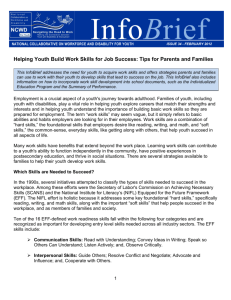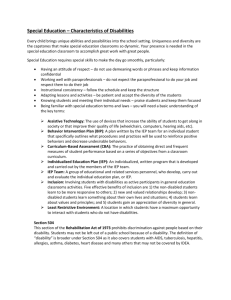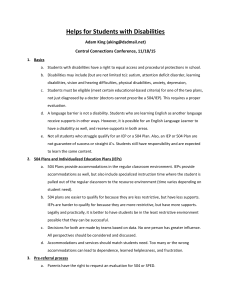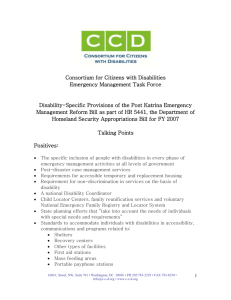English - NCWD/Youth
advertisement
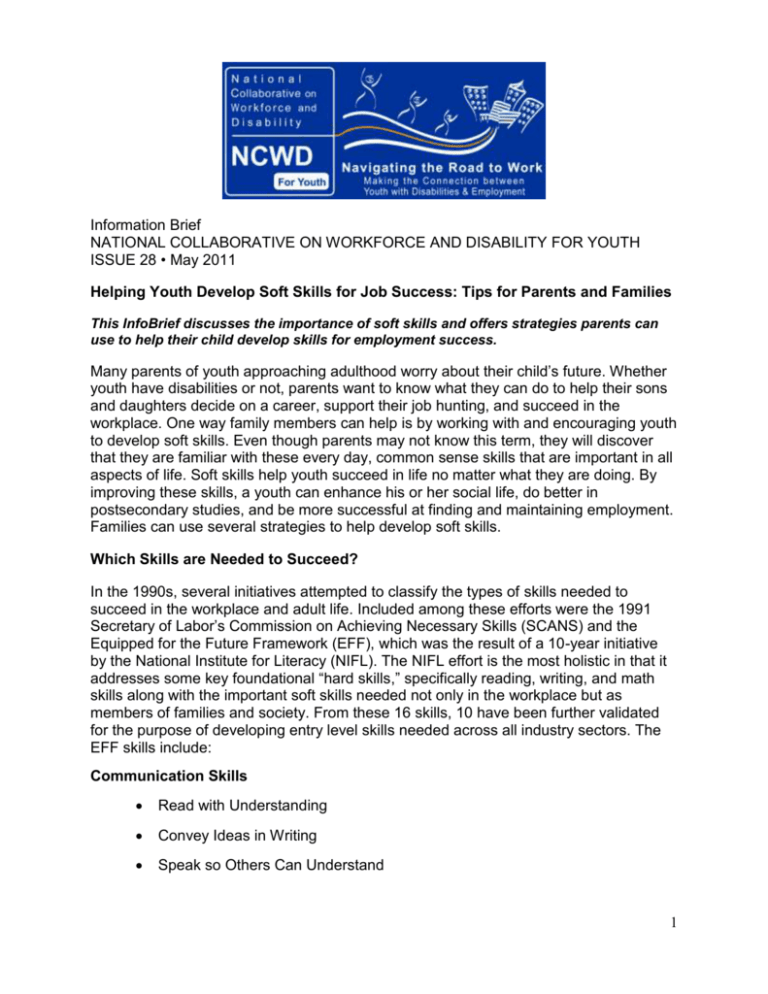
Information Brief NATIONAL COLLABORATIVE ON WORKFORCE AND DISABILITY FOR YOUTH ISSUE 28 • May 2011 Helping Youth Develop Soft Skills for Job Success: Tips for Parents and Families This InfoBrief discusses the importance of soft skills and offers strategies parents can use to help their child develop skills for employment success. Many parents of youth approaching adulthood worry about their child’s future. Whether youth have disabilities or not, parents want to know what they can do to help their sons and daughters decide on a career, support their job hunting, and succeed in the workplace. One way family members can help is by working with and encouraging youth to develop soft skills. Even though parents may not know this term, they will discover that they are familiar with these every day, common sense skills that are important in all aspects of life. Soft skills help youth succeed in life no matter what they are doing. By improving these skills, a youth can enhance his or her social life, do better in postsecondary studies, and be more successful at finding and maintaining employment. Families can use several strategies to help develop soft skills. Which Skills are Needed to Succeed? In the 1990s, several initiatives attempted to classify the types of skills needed to succeed in the workplace and adult life. Included among these efforts were the 1991 Secretary of Labor’s Commission on Achieving Necessary Skills (SCANS) and the Equipped for the Future Framework (EFF), which was the result of a 10-year initiative by the National Institute for Literacy (NIFL). The NIFL effort is the most holistic in that it addresses some key foundational “hard skills,” specifically reading, writing, and math skills along with the important soft skills needed not only in the workplace but as members of families and society. From these 16 skills, 10 have been further validated for the purpose of developing entry level skills needed across all industry sectors. The EFF skills include: Communication Skills Read with Understanding Convey Ideas in Writing Speak so Others Can Understand 1 Listen Actively Observe Critically Interpersonal Skills Guide Others Resolve Conflict and Negotiate Advocate and Influence Cooperate with Others Decision Making Skills Use Math to Solve Problems and Communicate Solve Problems and Make Decisions Plan Lifelong Learning Skills Take Responsibility for Learning Reflect and Evaluate Learn Through Research Use Information and Communications Technology Youth who have these skills are more likely to be hired and less likely to be firedgiving them an important advantage in today’s job market. Why is This Important? Learning soft skills is a process. Soft skills are necessary for youth to succeed in education, job training, independent living, community participation, and, ultimately, in the workplace. However, because educators and others have assumed that children learn soft skills at home, or through observing others, youth are seldom taught such skills in school. Unfortunately, this approach means that some youthwhether they have disabilities or notwill not have developed these important skills by the time they leave high school. Many youth experience difficulties as they transition from classroom to the workplace. For youth with disabilities, who face higher unemployment rates than their peers without disabilities, soft skills are especially important and may need more focused attention to master. Some youth have specific disabilities that make it hard for them to control impulses. Other youth may have limited insight into themselves or difficulty getting along with others. Youth have varying amounts of exposure to the working world. Some young people need to learn the importance of being at work on time, calling in when they are 2 ill, and getting along with co-workers. For these reasons, it’s vital that families help youth with disabilities develop soft skills. Families Can Help Build Soft Skills Families of youth with and without disabilities play a key role in helping their children learn expected behaviors, understand the unspoken rules of the workplace, and deal with personality conflicts. Parents are also aware of their child’s strengths and can build upon those assets in the process of developing soft skills. In addition to promoting soft skills at home, families of youth with disabilities can make sure that the development of soft skills is adequately addressed at school through their child’s Individualized Education Program (IEP) during the transition planning process of high school. If your family member does not have an IEP, soft skills development can also be addressed through other formal and informal goal setting plans. Another effective way for parents to help their family member develop basic employment skills, including soft skills, is to ensure that youth access, learn, and understand their career interest assessments, and engage in career exploration and real work experiences during the high school years. Research shows that work experience during high school, paid or unpaid, helps youth get jobs at higher wages after they graduate— this is true even for youth with significant disabilities. Parents and family members can use this information to advocate for workbased learning programs at school or help their son or daughter find summer jobs or volunteer opportunities in the community. When considering transition programs or community rehabilitation providers during and after high school, remember that real work experiences linked to classroom instruction is a much more effective approach than classroom instruction alone. How Families Can Build These Skills at Home COMMUNICATION SKILLS Does your child need to work on speech communication skills? According to annual surveys done by the National Association of Colleges and Employers, communication skills consistently rank among the top skills employers look for in a new employee. Helping youth improve communication skills will not only help them get a job, it can help them advance in their careers. How to Help: Use a flip cam or cell phone to record your child giving directions for using the microwave or doing something they are good at, such as playing a computer game. Review the video with them. Did they speak clearly? Were the instructions clear? Other family members and friends can provide feedback as well. Help your son or daughter build vocabulary by learning one new word each day by using resources such as Word of the Day (http://dictionary.reference.com/wordoftheday) or a dictionary. 3 Encourage your youth to participate in school activities that promote clear communication, such as a debate team. Discuss the different types of communication one might use in different environments such as with friends, in the classroom, in a professional setting, and with family. Doing so, would help your son or daughter understand what might be acceptable and expected in one setting may not be appropriate in another setting. Use a five-point scale to teach appropriate speaking volume or standing distance. For example, if your child tends to use a loud voice, teach him to equate his voice with a number. If the loudest voice is a five and a one is a soft voice teach him that using a two or three level voice is good at work. Suggest programming job-related phrases into your child's augmentative communication device, if he or she uses one. These may include “How may I help you?” and “Please wait while I find the answer to your question.” Does your family member pay attention to what others are saying and remember what was said? Listening to other’s needs and opinions is part of being a good communicator. Understanding and remembering what is said are important skills for the workplace when interacting with employers and customers. How to Help: Encourage your child to have conversations with family and friends. Listening to others and contributing to the conversation will help him develop listening skills. Model listening skills for your youth. Pay attention to speakers, repeat what was said, and ask questions. Give your family member directions for doing a chore such as laundry, mowing the lawn, or straightening a room, and then have him repeat the instructions in his own words. Have your child take beverage orders when guests visit. If needed, your son or daughter can take notes to remember who ordered what. Consider the accommodations your child may use in school. If your child uses accommodations to help pay attention to and understand the instructors in school, discuss how similar accommodations could be used in employment settings. Does your son or daughter communicate nonverbally in an effective way? Much communication is nonverbal. Nonverbal communication is important when interacting with employers, coworkers, and customers. Youth may need to improve 4 aspects of nonverbal communication, such as making proper eye contact. In addition, some youth have disabilities that make it difficult to read the nonverbal communication of others such as facial expressions and gestures. Families can help their youth improve these skills by practicing at home. How to Help: Have your family member look people in the eye and shake hands when introducing him to other adults. Practice the nonverbal language that would take place at a job interview. Let your son or daughter know that it’s important to have eye contact with the person doing the interviewing and to limit fidgeting or nervous movements. Model proper posture, such as standing up straight instead of slouching. Remind your child that proper posture communicates confidence. Show and explain that communication skills and personal boundaries may differ based on the setting and situation. For instance, a friend could demonstrate an acceptable distance between two people who are not related to one another, usually 1.5 to 4 feet. Have your child practice this. Discuss other potential strategies to improve communication skills with a young person’s IEP team and include a related goal, if he has a disability. If your child does not have an IEP, discuss strategies and related goals with his teachers and instructors. One strategy could be to have him look at a person’s nose or cheek if looking in someone’s eye is too distressing. It will appear as though he is making eye contact. INTERPERSONAL SKILLS Is your child ready to take direction from and work cooperatively with others? Teamwork and the ability to work well with others consistently appear among the highest ranked qualities employers are looking for in an employee in the annual surveys of National Association of Colleges and Employers. In today’s world, this includes the ability to communicate and work with people from different racial, religious, ability, and ethnic groups. How to Help: Encourage your child to help an elderly neighbor with yard work or volunteer as a family to serve a meal at a homeless shelter. Youth can learn about working with others by volunteering. Play games as a family and encourage team work. Board games help youth build many skills that apply to work: cooperating with others, taking turns, following rules, controlling emotions, and learning new knowledge and skills. Encourage your son or daughter to play a team sport. Sports help youth learn communication skills, decision making, self-control, and self-discipline as well as 5 learning how to work on a team. If your child isn’t skilled enough to play on the school team, consider opportunities to play sports at the local “Y”, community center, or with a faith-based center. Introduce your child to people who are different from him through taking part in community festivals that feature different cultures, attending various places of worship, or through books, magazines, film, television, or the internet. Start conversations about differences. Acknowledge that some people have ideas about people who are different from them. Discuss the situation if your family member experiences any type of discrimination. Talk about why discrimination exists. Reflect upon the feelings that come up when someone discriminates against a person and use it as an opportunity to teach the importance of not acting that way towards another. Does your youth know how to handle conflicts? Self-control, respecting others, and being able to deal with conflict are important soft skills. Refusing to follow directions and orders and the inability to get along with other people are among the most common reasons people get fired. How to Help: Help your child understand how his behavior may contribute to a misunderstanding. If he talks about a social mishap that happened at work, help him reflect on the situation. Ask your child to determine what he did right, and also discuss if there was anything he or his work colleagues could have done differently. If necessary, discuss next steps to address the misunderstanding. Practice how to handle challenging situations with role play. Choose roles and have your son or daughter respond. Talk about appropriate behaviors. Discuss ways that people on television shows handle anger. Many shows involve people fighting or otherwise acting out their anger. While watching one of these shows with your youth, talk about ways people can handle anger appropriately, such as counting to ten, taking a time out, or going for a run. Ask your family member what might work for him. Explain to your son or daughter that taking directions and accepting constructive criticism is a part of being an employee. Reinforce this skill by giving directions in the home for such things as chores. Make sure your child responds appropriately to the directions given, and practice more appropriate responses if she does not. Remind your child to treat others the way she wishes to be treated. Acknowledge that this is difficult when others are being rude, disrespectful, or mean. Talk about when it’s important to stand up for oneself, and when it’s best to just walk away. 6 Apologize to your son or daughter if necessary. Nothing makes a bigger impression on teens than adults admitting they were wrong. Is your child careful with his appearance? Good personal hygiene and appearance promotes social interaction with others while poor hygiene can give employers and co-workers a bad impression. How to Help: Discuss personal cleanliness, stressing that most workplaces require employees to dress in a specific way and to be clean. Require that your youth be dressed appropriately and have good hygiene when attending school, family functions, shopping trips, restaurants and/or faith based organizations. Model personal hygiene and dress to reflect what dressing professionally looks like. Is your son or daughter friendly, courteous, and tactful? Employers are looking for employees with good people skills. While especially important in jobs where employees interact with customers, people skills can also help interactions with co-workers, avoid conflict, and stand out from other job applicants or employees. How to Help: Teach your child phrases she can use on the phone: “May I please speak to Mr. Smith?” or in the workplace, “I’m Deborah. It’s nice to meet you.” Have your son or daughter answer the phone at home in a professional and courteous manner. Teach your family member to allow others to finish speaking before beginning to talk. Identify areas of social difficulty for your child and role play how to handle new or unfamiliar situations. Role playing gives her an opportunity to practice what she would say and do in various situations. Sign up your child with a disability for social skills trainings at school, independent living centers, disability groups, or self-advocacy organizations. These organizations and others provide youth with a structured opportunity to learn and practice social skills such as taking turns or giving compliments. LIFELONG LEARNING SKILLS Does your family member demonstrate personal responsibility, initiative, selfmanagement, and perseverance? 7 A strong work ethic, initiative, and decision-making skills are other skills employers consistently rank highly in the annual surveys of the National Association of Colleges and Employers. How to Help: Have your son or daughter take responsibility for taking care of a pet or getting ready for school or work. Give your child full responsibility for planning and preparing a family meal at least once a month. Help her at first, until she learns all the steps it takes to cook a family meal. Have your youth take charge of a task. For example, if she is planning to get a driver's license, have her call the Department of Motor Vehicles and make a list of the steps involved (getting a permit, enrolling in driver's education, taking written and behind-the-wheel tests, getting insurance). Help your son or daughter understand the unspoken expectations of employers: showing up on time, avoiding personal calls or texting at work, or if working in a public place such as a retail store or the food court at the mall, not having friends hang out at work. Have your family member visit a parent’s workplace, if the job allows this. She can learn different tasks associated with the job or follow other employees to learn what is involved in their jobs. Enroll your son or daughter in a mentor program. Mentors can help youth on many levels: building self-esteem, learning to stick with challenging activities, managing time, and communicating with other adults. Does your youth try to learn new things? Take your child to concerts, sporting events, or encourage participation in activities that match her interests. Ask your child to identify a simple, fun skill to learn. This could include cooking a certain recipe, working with a specific computer program, or learning a new game. Have him research information on steps for learning the skill and then help him follow the steps. Call or check online to find out about events that are open to the public at local colleges, art schools, music academies, museums or libraries. Family members can attend together and learn something new. Help your family member be independent by having him plan an outing using public transportation. Have your youth look up online or call the bus or subway department to find out routes, costs, bus stops, etc. Have your child look into using accessible transportation services, if he is eligible. Make sure your child 8 identifies which bus or subway to take, its departure time, and the right time to leave the house. If public transportation services are not available, have your son or daughter arrange for a ride from a friend. Addressing Soft Skills in the IEP Families of special education students can make sure that goals to build soft skills are incorporated into a student’s IEP during the middle and high school years. Some youth may already have many of these skills and only need to work on one or two. Including Soft Skills in the “Summary of Performance” The Individuals with Disabilities Education Act (IDEA) of 2004 requires schools to provide special education students with a “Summary of Performance” (SOP). This summary of a student’s academic achievement and functional performance should also include recommendations on how to assist the youth in meeting his or her postsecondary goals. The SOP is provided to special education students who are due to graduate with a regular diploma, or exceed the age eligibility for a free and appropriate public education (21 in most states). The SOP is most useful when linked with the IEP process and the student has the opportunity to actively participate in the development of this document. Parents can make sure that their child’s SOP lists the soft skills he has mastered in high school along with academic and technical skills. Students with disabilities who qualify for services from the state’s vocational rehabilitation (VR) agency can share this information with his VR counselor, as it would be helpful in the development of the Individualized Plan for Employment after he leaves high school. Such a list will make the SOP more helpful for service providers who work with employers and for the student himself to refer to when he is filling out a job application or creating a resume. You can find more information on the SOP here: http://www.nsttac.org/indicator13/sop.aspx Summary & Resources Both at home and at school, families and other caring adults play a vital role in helping young people with and without disabilities build work skills that will help them be successful in employment. Families who are aware of the expectations of employers, understand that they are partners in helping youth prepare for and maintain employment, and use everyday activities in the home to build work skills give their youth a much better chance of succeeding in the job search and in the workplace. REFERENCES Bullis, M., Nishioka-Evans, V., Fredericks, H. D., & Davis, C. (1992). Assessing jobrelated social skills of adolescents and young adults with behavioral disorders: Development and preliminary psychometric characteristics of two measures. Monmouth: Western Oregon State College. 9 Butterworth, J., & Strauch, J. (1994). The relationship between social competence and success in the competitive workplace for persons with mental retardation. Education and Training in Mental Retardation and Developmental Disabilities, 29, 118–133. Deloitte Consulting (2005). 2005 Skills Gap Report—A Survey of the American Manufacturing Workforce. Washington, DC: Manufacturing Institute. Johnson, D. W., & Johnson, R. T. (1990). Social skills for successful group work. Educational Leadership, 47, 29–33. National Association of Colleges and Employers, www.naceweb.org. National Collaborative on Workforce and Disability for Youth. Retrieved 8/1/2010 from http://www.ncwd-youth.info/definitions. National Secondary Transition Technical Assistance Center. Summary of Performance, Retrieved 8/1/2010 from http://www.nsttac.org/indicator13/sop.aspx. Education Secretary’s Commission on Achieving Necessary Skills (1991). What Work Requires of Schools: A SCANS Report for America 2000. Washington, DC: U.S. Department of Labor. (ED 332 054). Stein, S. (2000) Equipped for the Future Content Standards. What Adults Need To Know and Be Able To Do in the 21st Century. Washington DC: National Institute for Literacy. National Work Readiness Council. The Work Readiness Credential Profile: What New Workers in Entry Level Jobs Need to Be Able to Do. Retrieved 8/1/2010 from http://eff.cls.utk.edu/PDF/WRCProfileLink092005.pdf. The National Collaborative on Workforce and Disability for Youth (NCWD/Youth) is composed of partners with expertise in disability, education, employment, and workforce development issues. NCWD/Youth is housed at the Institute for Educational Leadership in Washington, DC. The Collaborative is charged with assisting state and local workforce development systems to integrate youth with disabilities into their service strategies. This Information Brief was written by the Pacer Center. To obtain this publication in an alternate format please contact the Collaborative at 877-871-0744 toll free or email contact@ncwd-youth.info. This Information Brief is part of a series of publications and newsletters prepared by the NCWD/Youth. All publications will be posted on the NCWD/Youth website at www.ncwd-youth.info. Please visit our site to sign up to be notified of future publications. This document was developed by the National Collaborative on Workforce and Disability for Youth, funded by a grant/contract/cooperative agreement from the U.S. Department of Labor, Office of Disability Employment Policy (Number #OD-16519-07-75-4-11). The opinions expressed herein do not necessarily reflect the position or policy of the U.S. Department of Labor. Nor does mention of trade names, commercial products, or organizations imply the endorsement by the U.S. Department of Labor. Individuals may produce any part of this document. Please credit the source and support of federal funds. NCWD/Youth 1-877-871-0744 (toll-free) 1-877-871-0665 (TTY toll-free) http://www.ncwd-youth.info contact@ncwd-youth.info 10

